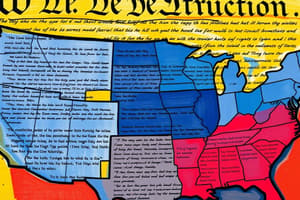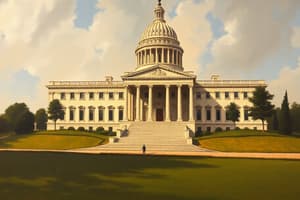Podcast
Questions and Answers
How is power distributed in unitary, federal, and confederate governments?
How is power distributed in unitary, federal, and confederate governments?
- Confederacy = Sovereignty lies with the central government
- Federal = Powers are split between a central government and local governments (correct)
- Unitary = Sovereignty lies with local governments
- Unitary = Powers are divided between state and national government
Which type of government structure would be threatened by debate over public policy?
Which type of government structure would be threatened by debate over public policy?
Dictatorships/Autocracies
What are the five basic American concepts of democracy?
What are the five basic American concepts of democracy?
1.) Belief in the fundamental worth of the individual. 2.) Equality under the law. 3.) Majority Rule while protecting minority rights. 4.) Maximize individual freedoms. 5.) Recognize that compromise is a necessity.
How has the Supreme Court's traditional interpretation of the commerce clause impacted federal power?
How has the Supreme Court's traditional interpretation of the commerce clause impacted federal power?
What are the basic principles of the social contract theory?
What are the basic principles of the social contract theory?
What four characteristics must a unit of government have to be considered a state?
What four characteristics must a unit of government have to be considered a state?
Who is known as the 'father of the constitution'?
Who is known as the 'father of the constitution'?
What were the anti-federalist's main arguments against the Constitution?
What were the anti-federalist's main arguments against the Constitution?
What were the main flaws within the Articles of Confederation?
What were the main flaws within the Articles of Confederation?
What constitutional crisis was revealed as a result of Shay's Rebellion?
What constitutional crisis was revealed as a result of Shay's Rebellion?
What is the difference between expressed, implied, delegated, and reserved powers?
What is the difference between expressed, implied, delegated, and reserved powers?
Why were the Federalist Papers originally written?
Why were the Federalist Papers originally written?
How is the American belief in popular sovereignty expressed in the U.S. Constitution?
How is the American belief in popular sovereignty expressed in the U.S. Constitution?
What are the major differences between divine right theory, social contract theory, force theory, and evolutionary theory?
What are the major differences between divine right theory, social contract theory, force theory, and evolutionary theory?
What are some common examples of the checks and balances found in the U.S. Constitution?
What are some common examples of the checks and balances found in the U.S. Constitution?
Flashcards
Unitary Government
Unitary Government
A system where all major powers and sovereignty reside with the central government.
Federal Government
Federal Government
Power is shared between a central government and local governments, with the central government holding sovereignty.
Confederate Government
Confederate Government
Sovereignty and most power is held by local governments, with the central government having limited authority.
Threats to Dictatorships/Autocracies
Threats to Dictatorships/Autocracies
Signup and view all the flashcards
Fundamental Worth
Fundamental Worth
Signup and view all the flashcards
Equality
Equality
Signup and view all the flashcards
Majority Rule
Majority Rule
Signup and view all the flashcards
Individual Freedoms
Individual Freedoms
Signup and view all the flashcards
Compromise
Compromise
Signup and view all the flashcards
Supreme Court and Federal Power
Supreme Court and Federal Power
Signup and view all the flashcards
Social Contract Theory
Social Contract Theory
Signup and view all the flashcards
Characteristics of a State
Characteristics of a State
Signup and view all the flashcards
James Madison
James Madison
Signup and view all the flashcards
Anti-Federalist Opposition to the Constitution
Anti-Federalist Opposition to the Constitution
Signup and view all the flashcards
Flaws of the Articles of Confederation
Flaws of the Articles of Confederation
Signup and view all the flashcards
Study Notes
Government Structures
- Unitary Governments: All major powers and sovereignty reside with the central government.
- Federal Governments: Powers are divided between the central government and local governments, with sovereignty held by the central authority.
- Confederate Governments: Sovereignty and major powers rest with local governments, not the central authority.
Threats to Government Structures
- Dictatorships/Autocracies: These government forms are at risk due to public policy debates that could undermine absolute control.
Core Democratic Principles
- Fundamental Worth: Emphasizes the value of the individual.
- Equality: All citizens are equal under the law.
- Majority Rule: Majority decisions are respected while minority rights are protected.
- Individual Freedoms: The focus is on maximizing personal liberties.
- Compromise: Acknowledges the necessity of finding mutually acceptable solutions.
Supreme Court and Federal Power
- The Supreme Court has interpreted the commerce clause to favor federal power, contributing to the expansion of federal authority through implied powers.
Social Contract Theory
- Governments are formed voluntarily by people; authority comes from the consent of the governed.
- People have the right to limit governmental power.
- If rights are violated, the social contract becomes void.
Characteristics of a State
- Must have:
- A defined population
- A specific territory
- An organized political structure (government)
- Sovereignty
James Madison
- Known as the "Father of the Constitution" for his pivotal role in its drafting and promotion.
Anti-Federalist Opposition to the Constitution
- Argued that it favored the wealthy; lacked a Bill of Rights; was deemed illegally organized; undermined state sovereignty; and risked despotism due to concentrated national power.
Flaws of the Articles of Confederation
- Congress lacked the power to tax or regulate trade; no executive branch existed; and amendments required consensus from all 13 states.
- Congress could conduct foreign affairs, borrow money, coin currency, set weights and measures, and raise volunteer armies from state militias.
Shay's Rebellion
- Exposed the inadequacy of the Articles of Confederation, highlighting the necessity for a national executive capable of enforcing laws when states failed.
Powers Defined
- Expressed Powers: Clearly enumerated in the Constitution (e.g., taxation, trade regulation, war declaration).
- Implied Powers: Derived from expressed powers and the necessary and proper clause (e.g., national bank establishment).
- Reserved Powers: Powers not given to the federal government, reserved for states via the 10th Amendment (e.g., education, marriage, driver's licenses).
Purpose of Federalist Papers
- Written to garner support for the Constitution, particularly in New York State.
Popular Sovereignty in the Constitution
- Expressed in the preamble with the phrase "We the people..."
Theories on the Origins of the State
- Divine Right Theory: Government and rulers derive authority from God.
- Social Contract Theory: Authority comes from the people's will.
- Force Theory: Government exists through the domination of the strongest.
- Evolutionary Theory: Governments evolve from familial structures to complex societies.
Checks and Balances in the Constitution
- Key examples include presidential vetoes, Congressional overrides, and impeachment processes to maintain balance among branches of government.
Studying That Suits You
Use AI to generate personalized quizzes and flashcards to suit your learning preferences.




